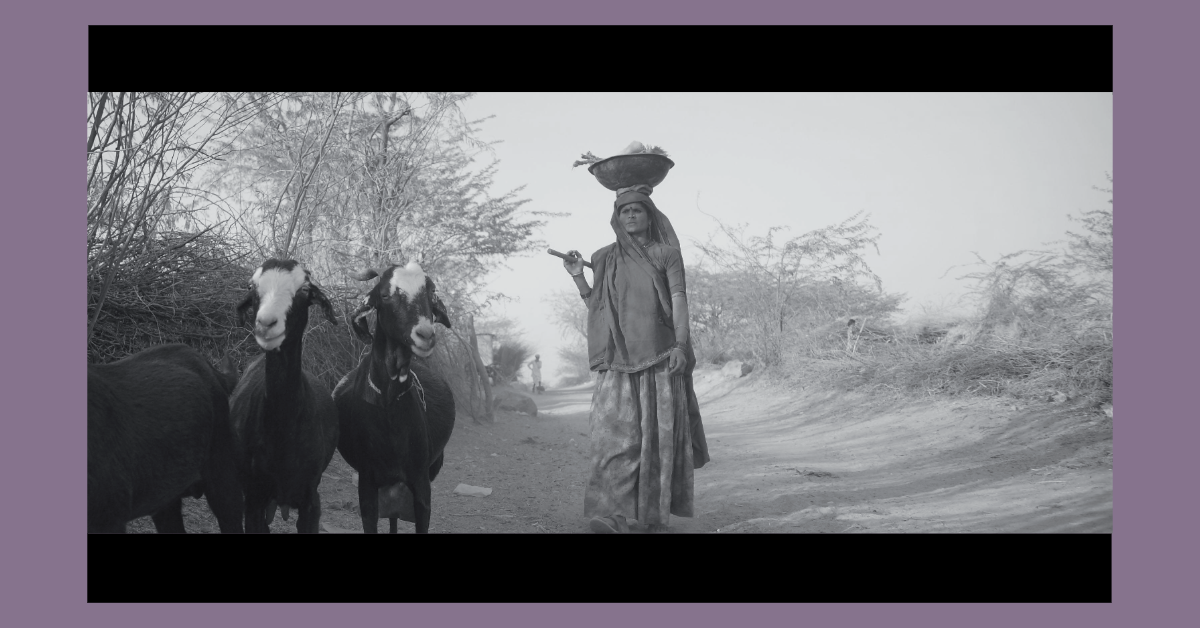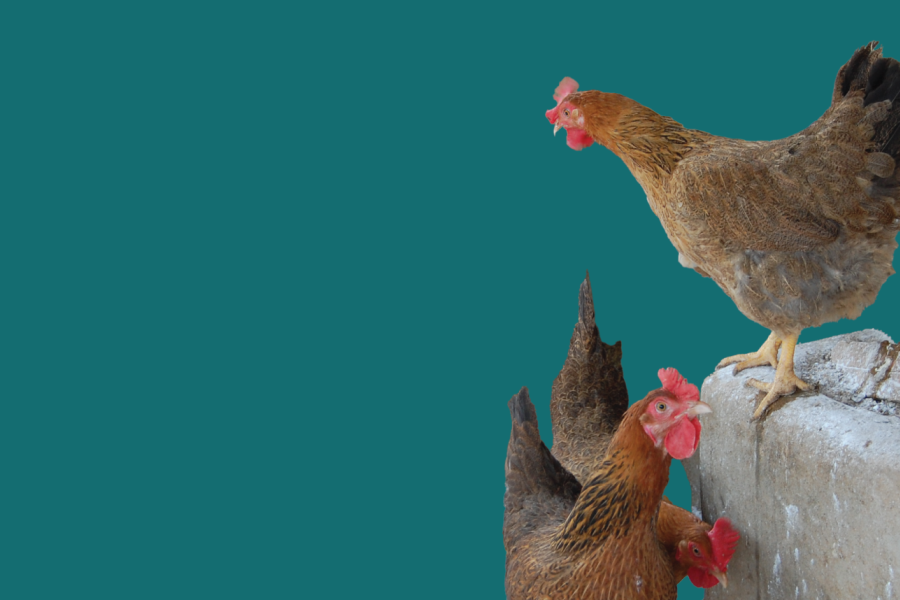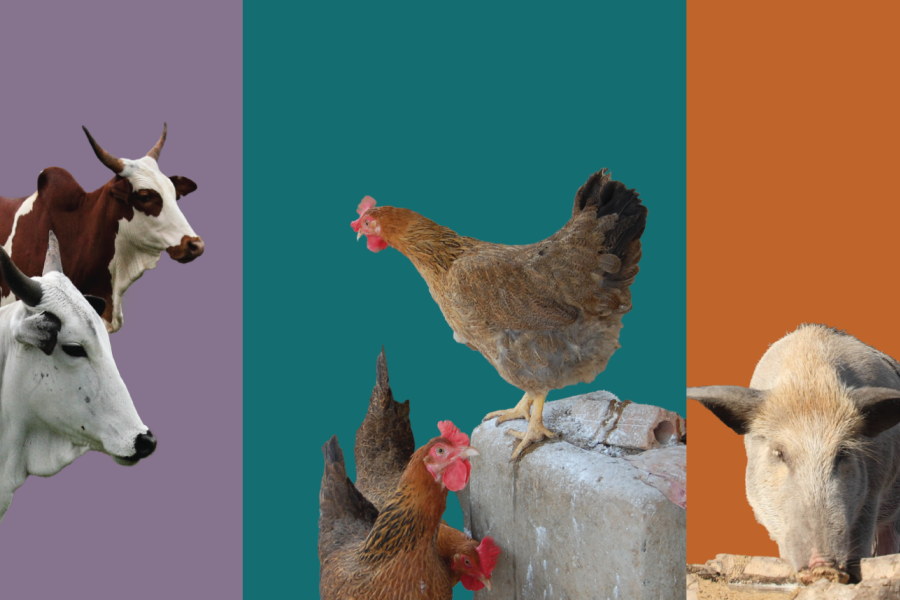Climate finance for livestock development: bridging the gap

S. Mann (ILRI)
This discussion addressed a crucial challenge in sustainable agriculture: unlocking climate finance for livestock development in low- and middle-income countries (LMICs)
Watch the recording
Why climate finance for livestock development?
The livestock sector in LMICs stands at a critical juncture. While it supports over 1.3 billion people, it's also responsible for up to 20% of human-induced greenhouse gas emissions. Despite its significant impact, the sector receives disproportionately low climate finance support.
This webinar explored evidence developed by the Livestock Data for Decisions (LD4D) Climate Finance Solutions Group, comprised of 20 international livestock and finance experts. A set of new evidence briefs and case studies aim to equip decision-makers with the knowledge needed to unlock climate finance for sustainable livestock development.
What you'll learn:
- The investment case for climate finance in the livestock sector
- Policy levers to unlock climate finance
- Methods for estimating livestock emissions to secure financing
- Real-world case studies of successful climate finance applications
- Insights from leading experts in climate finance and livestock development
Who is it for?
- Technical advisors and policymakers from countries seeking climate finance for livestock development
- NGO staff supporting climate finance applications
- Decision-makers in climate finance organizations
- Members of the livestock community interested in climate finance opportunities
Speakers
Experts from the LD4D Solutions Group on Climate Finance presented new evidence and insights on:
Building compelling investment cases for livestock sector initiatives
Andrew Bisson Senior Livestock Advisor for Bureau for Resilience, Environment and Food Security, United States Agency for International Development (USAID)
Andrew Bisson is a Senior Livestock Advisor at the United States Agency for International Development (USAID). He started his career in smallholder farm veterinary practice before completing an MSc in Tropical Veterinary Medicine and Epidemiology at Edinburgh University. He has lived and worked in several countries in East and West Africa, Asia and the Middle East, working with pastoral and mixed crop-livestock production systems. His interests include strengthening animal health service delivery including community-based animal health; transboundary and zoonotic disease control and One-Health initiatives; livestock market system development, and resilience programming.
Advanced methods for emissions quantification
Danielle Niedermaier Senior Manager, Global Monitoring, Evaluation and Learning, Land O'Lakes Venture37
Danielle Niedermaier is a Senior Manager for Global Monitoring, Evaluation and Learning at Land O’Lakes Venture37. She has 15 years of global development experience across 18 countries in livestock, dairy, crops, private sector engagement, and women’s empowerment. Danielle served as a sustainable agriculture Peace Corps Volunteer in Senegal and holds a master’s degree from Cornell University.
Gareth Salmon Senior Researcher, SEBI-Livestock
Gareth supports a range of SEBI-Livestock’s activities including monitoring and learning, and research on livestock production and economic modelling. He has experience working with livestock production in Low- and Middle-Income Countries, and also practical experience of livestock farming in the UK. Gareth holds a PhD from The University of Edinburgh and Scotland’s Rural College (SRUC), where he investigated productivity and GHG emissions intensity of Senegalese dairy production systems.
Strategies for developing effective national policies
Laura Cramer Policy engagement specialist for scaling Climate-Smart Agriculture, International Livestock Research Institute (ILRI)
Laura Cramer leads ILRI activities related to policies and institutions for scaling climate-smart agriculture. She also contributes to the Accelerating Impacts of CGIAR Climate Research for Africa (AICCRA) project as Theme Leader for policies and priorities and serves as Kenya country coordinator for the One CGIAR Low-Emission Food Systems initiative. Laura holds a PhD in public administration and policy, focusing on science-policy engagement from Wageningen University.
Real world examples of climate finance applications in the livestock sector
Bernard Kimoro Head of Climate Change and Livestock Sustainability, Ministry of Agriculture and Livestock Development, Government of Kenya
Bernard Nyakundi Kimoro coordinates Kenya’s Livestock Climate Change policies and measures that facilitate enhanced adaptive capacity and sustainable livestock systems which support resilience amongst farmers and pastoralists in Kenya. As a member of the Ministerial Climate Change Unit (CCU) he is also in the Kenya delegation that negotiates on agriculture (crops and livestock) issues under the UNFCCC agriculture negotiation platform. As a development agent, he has more than 20 years of skills and knowledge in the areas of livestock production and rural development; livestock project management; Livestock GHG modelling, inventory and MRV development; and Livestock Value Chain Development and Actor Empowerment.
Sintayehu Alemayehu Research Team Leader at The Alliance of Bioversity International and CIAT
Sintayehu Alemayehu coordinates climate action research and projects in East Africa. His work focuses on climate resilience solutions in agriculture, development, environment, and society. With experience in Africa, particularly in the IGAD region, Sintayehu works on project design and management, climate and agriculture risk management, food systems, finance, and climate-smart agriculture. He is actively involved in climate change adaptation and knowledge management, developing and managing projects to foster innovation and knowledge sharing. Sintayehu has authored publications including tools, methodologies, policy briefs, and peer-reviewed articles. His areas of work include digital agriculture and sustainable food systems.
Ricardo Gonzalez Quintero, Researcher, Alliance of Bioversity-CIAT
Ricardo Gonzalez-Quintero, a researcher in environmental modeling of livestock systems, works for the Tropical Forages Program at the Alliance of Bioversity International and CIAT. Ricardo holds a PhD in Animal Sciences and has expertise and experience in the environmental modeling/evaluation of agricultural systems using the Life Cycle Assessment methodology. As an environmental Modeler, Ricardo is responsible for modeling environmental impacts, and greenhouse gas mitigation and adaptation opportunities of livestock production systems across Latin America, the Caribbean, and Africa. He also serves as a reviewer in several reputed international journals.
Expert panel
The session also featured an exciting panel discussion with investors, policy makers and thought leaders working in this domain
Bruno Brasil Director of Sustainable Production and Irrigation, Ministry of Agriculture and Livestock, Government of Brazil
Bruno Brasil is Director of Sustainable Production and Irrigation at the Ministry of Agriculture and Livestock in Brazil and researcher at the Brazilian Agricultural Research Corporation (Embrapa). He is responsible for coordinating the Sectorial Plan for Adaptation to Climate Change and Low Carbon Emissions in Agriculture (ABC+ Plan).
Leonardo Gava Mataram Senior Brazil Agriculture Transition Manager, Climate Bonds Initiative
Leonardo is responsible for coordinating the CBI Agriculture Transition Program in Brazil. He has been working with sustainable agriculture practices since his undergraduate studies, both in Brazil and Europe. His previous studies focused on the effects of climate change on the dynamics of plant pathogens, and how to manage those threats in a new, more efficient and sustainable way. He has considerable experience in Data Sciences applied in the development of digital products and management strategies in the AgTech sector. In this field he has been involved in the construction of many algorithms with applications in the agriculture market, such as predictive models of plant diseases and risk assessment tools. Leonardo holds a bachelor in Agronomy (UEL with mobility at INP-Toulouse) and a M.Sc. in Plant Pathology (ESALQ-USP).
Anup Jagwani, Global Head of Agribusiness and Forestry, International Finance Corporation (IFC)
Anup Jagwani is the Global Head of Agribusiness and Forestry at the International Finance Corporation, part of the World Bank. IFC is the world’s largest development institution focused on the private sector in emerging markets and has investments in sustainable livestock companies. Anup has spent over 25 years in IFC’s investment operations working across regions and sectors, including manufacturing, agribusiness and infrastructure. Prior to this, Anup was the Global Head of Climate Finance and Policy where he led IFC’s work on Paris Alignment investing in sustainable and green finance, scaling use of carbon credits, and climate-related metrics.
Claudia Melim-McLeod Director, Future Horizons Institute (moderator)
Claudia Melim-McLeod is a Visiting Fellow at the University of Edinburgh Business School Centre for Climate Change and Sustainability (B-CCaS) and Director of Future Horizons Institute, where she works at the intersection of climate, nature, and finance. Claudia's background includes over 20 years of professional experience combining consulting, research, senior management and advisory positions at UNDP, UNEP, UN-REDD, the African Development Bank, KPMG and Rainforest Foundation Norway. She is the author of several publications on climate, nature and governance.
Harsha Vishnumolakala Analyst - Climate Policy Initiative
Harsha Vishnumolakala is an Analyst at CPI's London office, focusing on climate finance for agrifood systems. He supports the ClimateShot Investor Coalition (CLIC), an action-oriented group working to scale up finance for low-carbon, climate-resilient, and nature-positive agriculture and food systems globally. Harsha has contributed to key reports, including the Landscape of Climate Finance for Agrifood Systems, The Climate Finance Gap for Small-Scale Agrifood Systems, and the forthcoming Financing the Climate-Nature Nexus: Climate and Nature Solutions for Sustainable Livestock Production (title subject to change), developed in collaboration with FAIRR.
Why this matters:
With global food demand projected to increase by 30% globally (and up to 100% in some LMICs) by 2050, the livestock sector must become more efficient. Climate finance is a key part of achieving this balance, enabling the sector to produce more without increasing emissions.
Don't miss this opportunity to be part of the solution. Join us in bridging the gap between climate finance and sustainable livestock development, working towards a future where food security, nutrition, and livelihoods in livestock-dependent communities are improved while reducing environmental impact.





